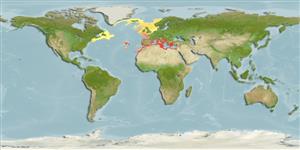Common names from other countries
Classification / Names / Names
ماع يماسا | فدارتم | Catalog of Fishes (gen., sp.) | ITIS | CoL | WoRMS
Environment: milieu / climate zone / depth range / distribution range
يسانش موب
یز حطس; قمع تارييغت 0 - 1022 m (Ref. 122930), usually 100 - 300 m (Ref. 8). Subtropical; 60°N - 27°N, 19°W - 36°E
Eastern Atlantic and the Mediterranean: from Scotland and Norway, south to Canary Islands and east to Turkey, eastern Mediterranean.
Length at first maturity / Size / Weight / نس
Maturity: Lm ?, range 1 - ? cm Max length : 2.2 cm CL يسنج صاوخ نودب / رن سنج; (Ref. 8)
Minimum depth from Ref. 8. Benthopelagic (Ref. 105772). Mesopelagic (Ref. 122930). Known from pelagic depths between 100 to 200 m (Ref. 92299). Abundant on the upper slope (Ref. 105772). Associated with the gorgonacean coral Isidella elongata (Ref. 122886). Found on seamounts (Ref. 122931). Carries out diel vertical migrations. Diet is based on pelagic crustaceans like euphausiids and calanoids, and bottom feeding has been reported to be minimal, as is the passive ingestion of forams. However, at night, large specimens feed near the bottom on suprabenthic gammarid amphipods. In general, predatory activity occurs higher in the water column at night (Ref. 105773).
Life cycle and mating behavior
غولب | لثم دیلوت | یزیر مخت | اه مخت | Fecundity | )ورال ( دازوت
Members of the order Decapoda are mostly gonochoric. Mating behavior: Precopulatory courtship ritual is common (through olfactory and tactile cues); usually indirect sperm transfer.
یلصا ذخآم
عجارم | هدننك گنهامه | ناراكمه
Williams, A.B., L.G. Abele, D.L. Felder, H.H. Hobbs Jr., R.B. Manning, P.A. McLaughlin and I. Pérez Farfante. 1988. (Ref. 2214)
NCUI زمرق تسرهف رد تيعضو (Ref. 130435)
ستياس رظن زا تيعضو (Ref. 108899)
Not Evaluated
Not Evaluated
یناسنا هدافتسا
تاليش – يريگ يهام: يراجت
| FishSource |
اهرازبا
يتنرتنيا عبانم
Estimates based on models
Preferred temperature
(Ref.
115969): 13.2 - 15.8, mean 14.3 (based on 141 cells).
یگدنهج
دايز, هام 51 زا رتمك ، تيعمج ندش ربارب ود يارب مزال نامز هنيمك (K=0.55-0.62).
تميق هقبط
Unknown.
